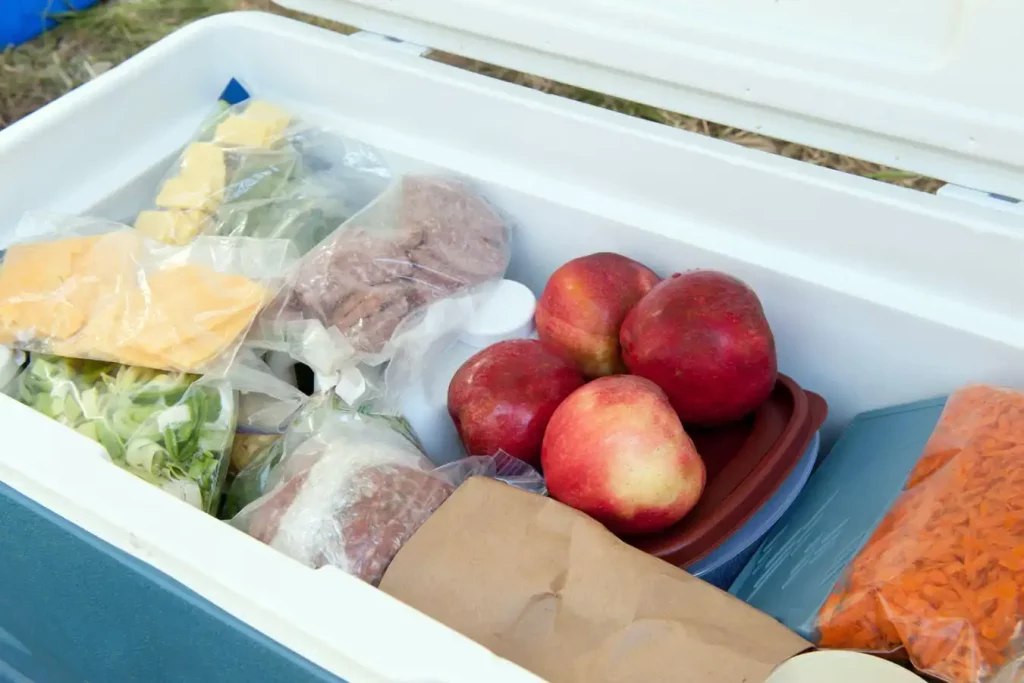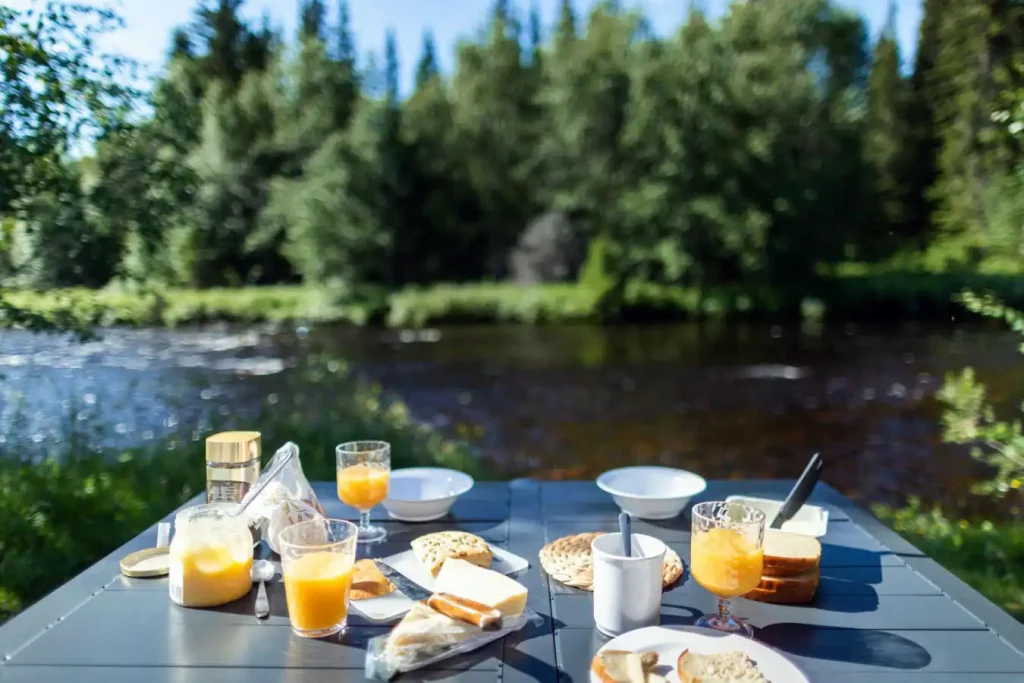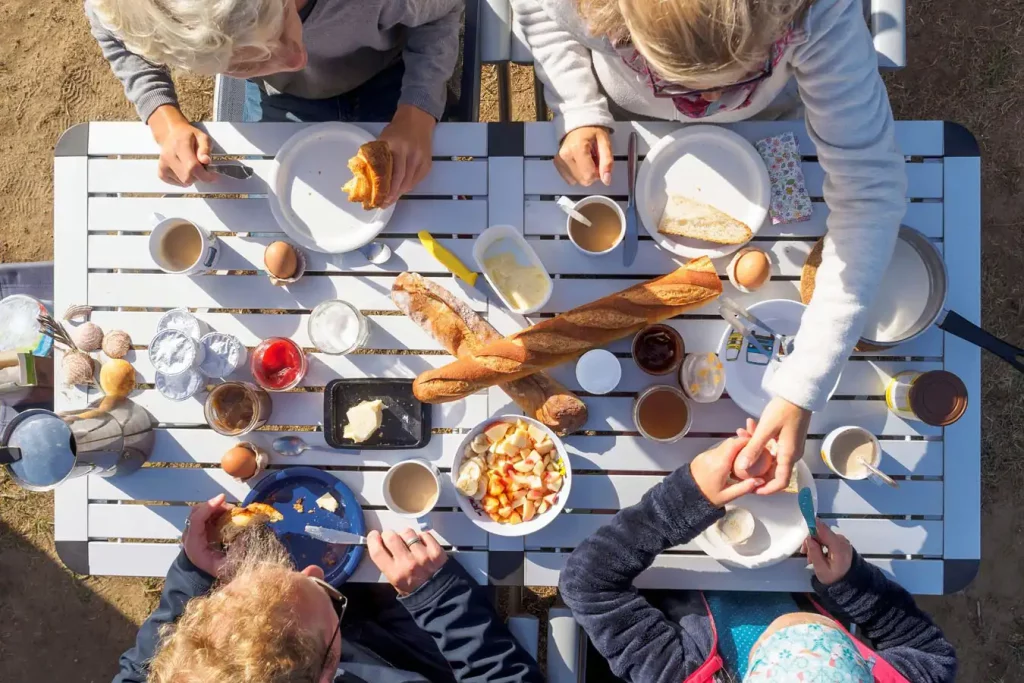What food should I bring for 3 days camping?
Even seasoned campers can be perplexed by this question.
In this beginner's guide, we'll tackle the necessities to keep you fueled and satisfied on your outdoor journey.
Importance of Planning Meals for Camping
Planning your meals for a camping trip is not just about deciding between s'mores or hot dogs. It's a strategic move that can make your camping experience more enjoyable and stress-free. Not having the right types or amounts of food can quickly turn a fun trip into a survival challenge.
By planning ahead, you ensure that you have the right mix of nutrition to fuel your camping activities, and you minimize waste. Plus, with a little creativity, you can elevate your campfire cuisine from ordinary to extraordinary!
Understanding Nutritional Needs While Camping
When you're in the great outdoors, your body works harder than usual. Whether you're hiking, fishing, or just setting up the camp, these activities demand more energy. Hence, understanding the nutritional needs while camping is crucial.
Energy Requirements
Camping activities often require endurance and strength, meaning your body needs more calories. Focus on foods high in protein and complex carbohydrates to provide sustained energy release. A breakfast burrito packed with eggs, beans, and cheese or dinner featuring quinoa salad with vegetables can be excellent choices. Snacks like trail mix or energy bars can also keep you going during the day.

Hydration Needs
Hydration is just as crucial as nutrition during camping. Water loss can sneak up on you, especially in hot weather or high altitudes. Remember to drink water consistently, not just when you're thirsty. And don't forget that you can also hydrate through your meals! Foods with high water content, like fruits and vegetables, can contribute to your hydration goals. Soup packets are also easy to pack and can be a warm, hydrating meal option.
Key Factors to Consider When Planning Camping Meals
The allure of campfire-cooked meals and the joy of sharing food with companions in a beautiful outdoor setting is an integral part of the camping experience. But before you can enjoy those moments, there's some planning to be done. Here are the key factors you should consider when planning your camping meals.
Duration of Camping
The length of your camping trip significantly affects the type and amount of food you should pack. For a three-day camping trip, you will need at least nine meals plus snacks. Plan each meal ahead of time and pack accordingly. This way, you won't risk running out of food or carrying too much that goes to waste.
Cooking Facilities Available
Are you camping with a fully-equipped RV kitchen, or are you backpacking with only a compact camping stove? The cooking facilities at your disposal determine what meals you can prepare. With limited facilities, it's often best to stick with meals that are easy to cook or can be eaten raw. Dehydrated meals or no-cook foods like canned tuna and tortillas can be a great choice.
Dietary Preferences and Restrictions
Consider the dietary needs and preferences of everyone in your group. If someone is vegetarian, gluten-intolerant, or allergic to peanuts, you'll need to account for that in your meal plan. There are plenty of camping-friendly meals available for almost every dietary restriction, so do a bit of research to ensure everyone has something delicious to eat.
Weight and Portability of Food Items
When you're carrying all your supplies on your back, every ounce counts. Opt for lightweight and compact food items that won't weigh you down. For instance, choose pasta or rice over heavy cans, and opt for trail mix instead of fresh fruit for snacks.
Preservation and Storage
Remember that you won't have a refrigerator to store your food. Pack foods that are shelf-stable and won't spoil quickly in outdoor temperatures. If you do bring perishable food items like meat or dairy, plan to eat them early in your trip. Also, consider how you will secure your food from wildlife at night.
Taking the time to consider these factors can make a huge difference in your camping experience. Remember, a successful camping trip is not only about the trail you hike or the fish you catch; it's also about the delicious meals you enjoy in the heart of nature.
Day-by-Day Food Breakdown
Planning out a camping menu may seem daunting, especially if it's your first time. But don't worry! We've got you covered with a suggested day-by-day meal plan for your three-day camping adventure.
Day 1: Arrival Day
The first day of camping usually involves setting up your campsite and getting settled. Keep meals simple to save energy for these activities.

Breakfast
Start your day right with a hearty breakfast at home before heading to your campsite. If you're leaving early in the morning, overnight oats or a breakfast sandwich can be a great grab-and-go option.
Lunch
By lunchtime, you should be at your campsite but might not have everything set up yet. A no-cook lunch would be perfect for this. Think along the lines of PB&J sandwiches, hard-boiled eggs, or canned tuna with crackers. Don't forget a piece of fruit for added nutrition.
Dinner
After setting up your camp, reward yourself with a simple yet delicious dinner. If you brought perishables, use them first. Grilled chicken, veggies, and a foil-wrapped baked potato is a satisfying meal that's easy to cook over a campfire.
Snacks
Pack trail mix, granola bars, or dried fruit for a quick energy boost throughout the day.
Day 2: Full Camping Day
This is the day to enjoy your most elaborate meals as you'll have more time and resources at your disposal.
Breakfast
Kick-off your full camping day with a warm and fulfilling breakfast. Scrambled eggs with some chopped veggies, prepared over your camping stove, along with some pre-cooked bacon can be a delightful start to the day.
Lunch
For lunch, consider easy-to-assemble wraps with your favorite fillings. You can use canned chicken, mayo, and a bag of salad for a quick and satisfying meal.
Dinner
Dinner is the time to treat yourself. Try foil packet meals like shrimp boil packets or chicken fajita packets. These are simple to prep at home, easy to cook over the campfire, and offer a flavorful end to your day.
Snacks
Don't forget your snacks for the day. Fresh fruits like apples and oranges can be a refreshing choice.
Day 3: Departure Day
On the last day of camping, focus on using up your supplies and keeping meals easy to clean up.
Breakfast
Instant oatmeal with a handful of nuts and dried fruits can be a quick, nourishing start to your last day. If you have any remaining eggs, you could make a simple omelet.
Lunch
Lunch should be light and easy to pack up. Consider hummus and veggie wraps, or if you have any leftovers from previous meals, now is the time to finish them off.
However, when packing food for a 3 days camping trip, opt for non-perishable and easy-to-cook options like dehydrated meals, canned goods, granola bars, and dried fruits, ensuring you have a mix of nutrition, convenience, and portability.
Remember, these are just suggestions and you should adapt according to your dietary needs and preferences.
Read more: The Best Time to Go Camping
Meal Planning and Preparation Tips
Camping should be a fun experience, not a stressful one. The right preparation before your trip and smart techniques while you're there can make the difference. Let's explore some key points in this aspect.
Pre-Camping Preparation
Before you even pack your first item, have a meal plan. Knowing what you'll eat each day can help you avoid overpacking and forgetting key ingredients. Prep as much as you can at home, like marinating meats, pre-cutting veggies, or even pre-cooking certain meals. This way, you'll spend less time preparing meals and more time enjoying the outdoors.
Efficient Packing Techniques
When it comes to packing food for camping, efficiency is key. Store your prepped meals in reusable containers, label them, and pack according to the order you'll eat them. Remember to balance the weight in your backpack or cooler for easy carrying.
Making Use of Local Resources
Be open to purchasing fresh produce from local farmers' markets if your camping site is near one. Not only does this support local businesses, but you'll also enjoy fresh ingredients that are often superior in taste and nutrition.
Best Practices for Food Safety While Camping
While camping can be quite the adventure, food safety is one aspect where we shouldn't take any risks. Here's what you need to know:
Storing Food Correctly
Keep your food stored in airtight containers or zip-lock bags. Perishables should be kept in a cooler with enough ice or ice packs to keep them at safe temperatures. Also, store your food out of reach from wildlife to avoid unexpected visitors.
Proper Food Handling
Always wash your hands before preparing or eating food. If water and soap are not available, use hand sanitizers. Avoid cross-contamination by using separate cutting boards and utensils for raw and cooked foods.
Cleanliness and Sanitation
Maintaining cleanliness in your camp kitchen is essential. Clean up all food and crumbs immediately after meals to prevent attracting wildlife. Wash all your dishes and utensils promptly and dispose of trash responsibly.
Remember, a safe and enjoyable camping trip comes down to thoughtful planning, smart packing, and practicing food safety.
For better food safety know more: How to Pack Eggs for Camping
FAQs about What Food Bring for 3 Days Camping
What is the best food to bring for camping?
How do you store food for a 3 day camping trip?
What food to bring camping for 4 days?
What food to take on a 2 day camping trip?
Final Thoughts
Well, that's a wrap! We've ventured through the importance of proper food planning for camping, considered our nutritional needs, and contemplated key factors like duration, cooking facilities, and dietary restrictions.
With a day-by-day meal breakdown, tips for planning and preparation, plus best practices for food safety, you should now be ready to pack up and head for the hills. Remember, good meal planning ensures you can relish every moment of your camping experience without having to worry about what's on the menu.
Learn more: Exactly what is Bushcraft Camping


